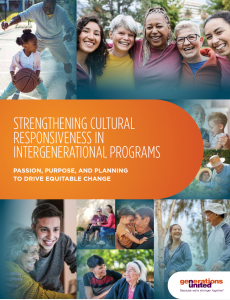 Download the report in English
Download the report in English
Download the report in Spanish
Watch the release event on YouTube
Listen to the podcast of release event
As part of Generations United’s diverse intergenerational programs initiative, we conducted a national survey of programs that connect younger and older people. Based on those findings, we commissioned this report, Strengthening Cultural Responsiveness in Intergenerational Programs: Passion, Purpose, and Planning to Drive Equitable Change, to highlight the intentional and creative ways that organizations are combatting systemic racism by prioritizing the voices and lived experiences of diverse staff and participants in their practices.
To learn more about the status of cultural responsiveness in intergenerational programming, we conducted interviews with four intergenerational programs and reviewed over 50 programs. Interview questions were developed that addressed volunteer and staff recruitment and retention, diversity training, program replicability, scalability, how programs “define” diversity and community engagement. Based on these interviews and program reviews, several themes surfaced which provided the basis for the report’s 5 recommendations:
- Embracing cultural inclusivity is a journey. Don’t be afraid to be adaptable, flexible, and allow time for the journey to unfold.
- Be intentional, specific, and targeted about uplifting diversity. All levels of the organization need to be held accountable to truly make this a “team” effort.
- Be proactive in seeking out allies and collaborators who bring a fresh and diverse perspective to your program and can serve as program ambassadors.
- Equip participants in diverse intergenerational programs with the tools to enact change in their communities.
- Diversify your approach. Creativity and flexibility are instrumental in the implementation of organizational cultural practices and protocols.
Advancing equity is not without its challenges. These programs encountered challenges related to staff and participant resistance, lack of community buy-in, and difficulties incorporating diversity in a diverse community. These issues can be overcome with time, thoughtful planning, and persistence. This report is only the first step in exploring and uplifting cultural responsiveness in intergenerational programming. Generations United urges you to serve as a change agent to find creative and intentional ways to uplift cultural responsiveness in your community.